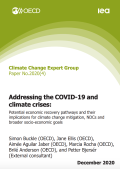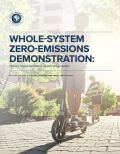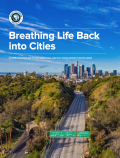The report is the last of three framework reports developed by the Circular Cars Initiative to help the sector and its regulators better understand automotive’s new sustainable future.
This report proposes a framework for prioritizing US and Canadian regions for electric truck deployments based on differences in key enabling traits. The highest priority regions share traits such as relatively mild weather, cheap electricity prices, high levels of freight movement, a pressing need to improve air quality, and supportive policies and incentives.

This paper provides decision-makers with a framework for prioritising different economic, social and environmental goals and analysing the options available to achieve them. To this end, it develops three stylised COVID-19 recovery pathways (“Rebound”, “Decoupling” and “Wider well-being”) that differ in the extent to which they encompass greenhouse gas (GHG) emission reductions and the integration of mitigation and wider well-being outcomes or, broadly equivalently, SDGs.

This report introduces a new concept — Whole-System Zero-Emissions Demonstration (WS-ZED). The WS-ZED concept goes one step further than net-zero carbon and proposes a broader concept to reveal the added value of synergy among net-zero carbon, net-zero waste, and net-zero pollution. This new concept aims to resolve these growth challenges by adopting a holistic approach to put in place urban management policies to combat both climate change and environmental degradation.

For a few weeks in March and April 2020, the COVID-19 lockdown brought about an unexpected side effect: dramatically cleaner air and endless vistas unlike anything cities have experienced in living memory. As 2020 progressed, the pandemic, the economic downturn, and a growing reckoning with racial injustice in the United States converged to place economic, social, and public health strains on local governments. Efforts are now underway by these governments to help their communities recover. As they do so, there is an opportunity to implement local changes that can deliver multiple community benefits while also helping to accelerate recoveries. There is an opportunity to build back better.
Air quality and equity are highly interconnected issues. And there are actions cities can take to help address them both simultaneously.
